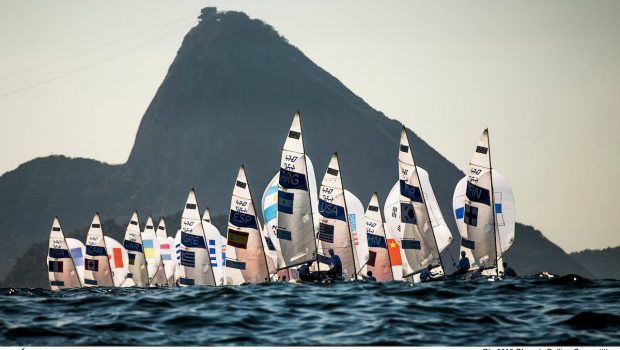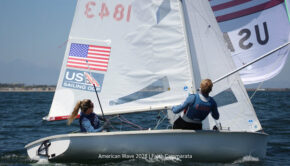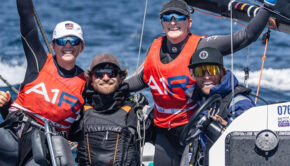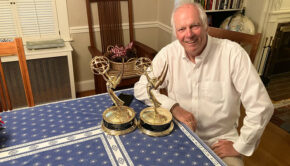Looking back on the Rio Olympics
Published on August 19th, 2020
Four years ago, Scuttlebutt editor Craig Leweck was in Brazil to report on the Rio 2016 Olympics. With the Tokyo 2020 Games postponed until 2021, we keep that Olympic Flame alive through Leweck’s observations from the Carioca nation… here was his thirteenth report:
Rio de Janeiro, Brazil (August 18, 2016) – Creating an Olympic Games highlight moment with impact is the mission of the Medal Race. After a series of 10 to 12 races, the top ten in each event advance to double-point, non-discard race. A lifetime of effort is put to the test. Who can stare down pressure and be triumphant, and who would get swallowed whole by the moment?
Not all were so eager for this weighted race on the Pao de Acucar course, positioned close to Flamengo Beach and the 396-meter tall Sugarloaf Mountain. The landscape plays tricks on the wind. No lead is safe, no amount of leverage without risk.
Four Champions were named prior to the Medal Race, each with enough lead to avoid defeat. An impressive feat to avoid the dangers of a venue fully able to break hearts. But six others had to take on the test, and what a show it was. The course was conquered by some, crushed by others. Here’s the recap:
We saw Dorian van Rijsselberghe (NED) put on a freakish performance in the RS:X Men, rising to the occasion and dominating in a manner not recently witnessed. With gold already in hand, Dorian needed to only survive the finale, but he went out and put his stamp on the race, crushing the field again. Epic! Nick Dempsey also has silver in hand, with only Pierre Le Coq (FRA) moving up to bronze.
In the RS:X Women, the field was wide open where any of the top eight could reach the podium. The occasion required someone to step forward, and on that day it was Charline Picon (FRA) who gripped the lead to vault from fourth to take the gold. The young Russian Stefania Elfutina (RUS), tied for the lead before the Medal Race, faced disaster off the start line with a foul, but fought her way back to claim bronze. As Peina Chen (CHN) moved up from bronze to silver, Flavia Tartaglini (ITA) got dealt the worst hand, falling from the lead all the way down to sixth, swallowed whole by Pao de Acucar.
The record sixth medal for Robert Scheidt (BRA) did not occur, though he moved up to fourth overall as he closed strong, dominating the Laser Men Medal Race. The race for gold was decided at the start as Tom Burton (AUS), who was trailing Tonci Stipanovic (CRO) by 10 points, got a foul on the Croatian to set the table. Burton finished third to Stipanovic’s ninth for the Aussie to move up a step to gold, leaving silver for the Croatian, while Sam Meech (NZL) was unchanged in bronze.
The fight for gold in the Laser Radial Women was a three-way battle between Marit Bouwmeester (NED), Anne-Marie Rindom (DEN), and Annalise Murphy (IRL). It was familiar territory for the Dutch and Irish sailors, a flashback to the showdown four years ago at London 2012. In the Medal Race, as the Dane languished in the rear, the gold got tossed back and forth as Bouwmeester and Murphy were muddling mid-fleet, with the final run giving gold to Bouwmeester, the 2012 silver medalist. After getting left off the 2012 podium, Murphy claimed silver with Rindom getting bronze.
Giles Scott (GBR) had already wrapped up the Finn gold medal before contesting the Medal Race, not an easy feat to have a 24-point lead after 10 races. He tried hard to win the Medal Race too, exerting unmatched energy in the free pumping downwind. It would move him up to second but no further as American Caleb Paine led wire to wire to pull up from fourth to bronze. Vasilij Zbogar (SLO) remained in silver, but a last by Ivan Kljakovic Gaspic (CRO) saw him fall from bronze to fifth.
The race for gold in the Nacra 17 could not have been more suspenseful. Ssntiago Lange and Cecilia Carranza Saroli (ARG) had a five point lead over Italy, but a port-starboard foul off the start line put the Argentinians on their back foot. Rounding the first windward mark in last, they had fully fallen off the podium. But as the oldest sailor at the Games, Santi reached into his war chest, moving up to sixth at the leeward mark with one lap to go. But disaster struck again at the final upwind mark as they fouled Austria. How could they still win gold after two fouls and two penalty turns? But they did, with one point to spare over Jason Waterhouse and Lisa Darmanin (AUS) with Thomas Zajac and Tanja Frank (AUT) in bronze. As for the Italians, Silvia Sicouri and Vittorio Bissaro dropped all the way to fifth, another Medal Race casualty.
Hannah Mills and Saskia Clark (GBR) had already won the Women’s 470 gold medal before the Medal Race, but places second to seventh were in play for silver and bronze. Americans Annie Haeger and Briana Provancha grabbed the early lead, looking to raise their rank from bronze to silver, but it all got away from them on the second beat. 2012 Olympic Champions Jo Aleh and Polly Powrie (NZL) took advantage of some separation to regain silver, while reigning World Champions Camille Lecointre and Hélène de France (FRA) moved up from fourth to bronze. As for the Americans, penalty turns dropped them down to seventh overall, another victim of the Medal Race.
The top three teams in the 470 Men would all medal, but the color still needed to be decided. 2016 World Champions Sime Fantela and Igor Marenic (CRO) had the edge with an 11 point lead, and never let Panagiotis Mantis and Pavlos Kagialis (GRE) and Mat Belcher and Will Ryan (AUS) out of their sight. It became a race for silver, one which the Aussies held until crew Will Ryan slipped off the boat and needed to be recovered. Austria rounded the final upwind mark ahead, but Australia still had some fight left, making the pass on the downwind leg to regain silver just before the finish. Austria would settle for bronze.
For Peter Burling and Blair Tuke (NZL), their quad of domination had built a golden 34 point lead before the Medal Race. No worries, mate, the Kiwis did what they do, easily outpacing their rivals to torch the finale as well. Once again, silver was the remaining prize, but 2012 gold medalists Nathan Outteridge and Iain Jensen (AUS) held it from the start, getting an early edge on Erik Heil and Thomas Ploessel (GER) and easily getting the needed boat in between. Bronze to the Germans.
The 31st Olympiad could not have ended any better as four 49erFX teams were within one point of gold in a winner take all finale. Martine Soffiatti Grael and Kahena Kunze (BRA) and Alexandra Maloney and Molly Meech (NZL) got off the start line best, with the Kiwis taking the lead. Brazil chased after two laps, and got a split gate for the final upwind leg. Brazil got enough separation, and a shift, to take the lead at final upwind mark. The two teams, hitting 16 knots, dueled to the finish. It was brilliant television. The Kiwis would settle for silver while Jena Mai Hansen and Katja Salskov-Iversen (DEN) held bronze around the track. Left off the podium, yet leading before Medal Race, was Tamara Echegoyen and Berta Betanzos Moro (ESP).
With all the trepidation entering the Olympic Games, Rio triumphed… just in time. A complete series was sailed, and it was a good series. “We all had our concerns but the event was very, very good,” remarked World Sailing President Carlo Croce. “Both on the water and on land, we see this as a success. We are already getting very positive feedback from the International Olympic Committee. This is good news for us.”
And so one quad ends, and another now begins. Tokyo 2020 here we come.
Event details – Results – Photos
Racing was staggered among the 10 events from August 8 to 18, with August 19 as a spare day if needed. It wasn’t.









 We’ll keep your information safe.
We’ll keep your information safe.